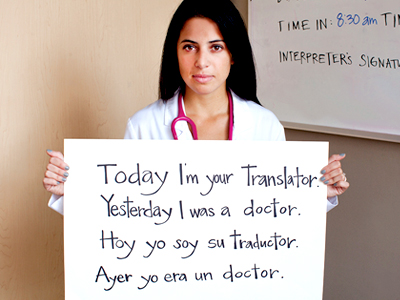
Recognition of immigrant professionals an ongoing challenge ---
In 2007, a young doctor named Paola left her job and life in Chile to move to the U.S. Originally from Colombia, she had a valued job at one of the Chile’s largest public hospitals. It was at that same hospital where she met an American man who eventually became her husband. In order to start a life with him, she left her secure position at the Santiago hospital and moved to the U.S.
“It was a hard decision to make,” she explains, “but I always thought that one could be the most successful person in the world, but if you do not have anyone to share this success with, it is not worth it."
Though she is a skilled doctor, her professional credentials were not recognized in the U.S. She could not work as a doctor.
"For a long time I didn't do anything, because I didn't have the contacts or anything,” she says.
The Migration Policy Institute (MPI) estimates that more than 1.6 million college-educated immigrants in the United States were underemployed or unemployed as of 2011.
Foreign-trained professionals often encounter difficulties putting their skills and professional and academic experience to good use in the host-country labor market, particularly in regulated professions. There are a number of reasons why barriers to practicing the profession in which foreign workers are trained can arise, among them differences in education and training, language proficiency or employer resistance to hiring a candidate with unfamiliar qualifications.
For occupations that require licensing or registration—such as in engineering or health care—examinations, application fees or supervised training requirements can represent additional barriers to entry.
A new report by MPI, Tackling Brain Waste: Strategies to Improve the Recognition of Immigrants’ Foreign Qualifications, examines ways to improve the recognition of foreign credentials and other challenges that keep many immigrants from fulfilling their professional potential.
“Foreign professionals, especially the newly arrived, are often not completely interchangeable with their locally trained counterparts,” the report says. “As a result, effectively demonstrating that their training meets local standards may not be enough; they may also require opportunities to fill knowledge deficits without prohibitive time and expense.”
“If you are an immigrant it can be difficult to know the licensing requirements - in other countries, licensing is centralized, but in the U.S. it is state by state,” says Anne Kirwan, Managing Director of the San Francisco office of Upwardly Global, an organization that helps immigrants return to their professional careers.
Upwardly Global provides pathways to licensing and step by step licensing guides for doctors, nurses, teachers, engineers, archaeologists and other top professions.
“We believe that immigrants should meet the same high standards as American professionals, that there should be standards in professions that are regulated,” adds Kirwan.
Doctor Paola eventually connected with Upwardly Global. “They really changed my life,” she says.
The Upwardly Global team helped Paola with networking, refining her resume and cover letters, and connecting her with different groups such as the National Forum for Latino Healthcare Executives. She also volunteered as a researcher for two medical researchers, building her local reputation. Eventually she found work in hospitals as a Spanish-English medical interpreter, which allowed her the time and flexibility to prepare for her U.S. medical licensing exams.
Paola successfully completed the required steps of the exams and applied for residency positions. Upwardly Global staff helped her craft her personal statement and prepared her for 5 residency interviews. Her determination paid off: she matched with a Chicago-based program as a family medicine resident starting in July 2012.
Paola’s decision to come to the U.S. was rooted in her desire for love and family. She does not dwell on the sacrifices she’s had to make but looks to the future.
“If you really, really want it and understand that it's going to be hard,” she says, “you'll see that it pays off in the end."

